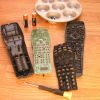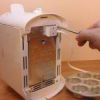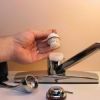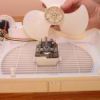Household Glues and Adhesive

There is a variety of household glues and adhesives to help repair hundreds of broken things around the home.
Things come apart. Fortunately, the Fix-It Club knows how to put them back together with glues and other adhesives. Adhesives secure the surfaces of two materials together. There are many types of glues, most of them designed for use with specific materials and under specified conditions.
Types of Adhesives
Adhesives come in liquid, solid, or powder form, and some require a catalyst to activate them. Select adhesives based on their characteristics, strength, setting time and temperature, and bonding method. For example, cyanoacrylate (instant glue) is preferred for permanently bonding rigid plastic parts that don’t face temperatures over 150 degrees. Some glues are waterproof while others are not; some need to be held together (clamped) while drying and others don’t. Read the instructions on the label for the appropriate application and use.
Best Adhesives
The most versatile adhesives include acrylic (for metal, glass and wood), cyanoacrylates (also known as super glue; best for plastic, rubber, metal, ceramic, glass, and hardwood),epoxy (for any materials), hot melt adhesive (for fabric, leather, and wood), resorcinol (for wood, plywood, chipboard, and paper), and urethane (for wood, metal, and glass). Nearly as good are urea formaldehyde (for wood), and yellow glue (also known as carpenter glue; for interior wood. Make sure you match up the appropriate adhesive with the material, conditions, and use for best results.
You’ll also see adhesives used in the Fix-It Guides. Experienced hardware store clerks, too, can offer suggestions on which household adhesives to use on your repair job.
–Dan “The Fix-It Man” Ramsey









You must be logged in to post a comment.